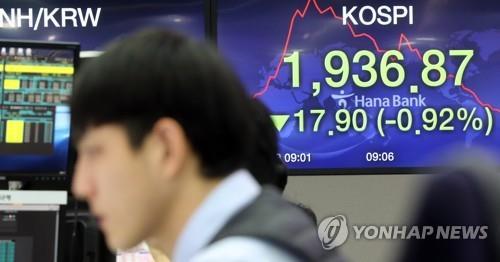Finance
Korea to tighten rules on stock short selling amid market fluctuations
South Korea’s financial authorities said on March 10 they will tighten regulations on stock short selling as part of market stabilization measures amid increased fluctuations sparked by the outbreak of the new coronavirus and a slide in global oil prices.
Finance Minister Hong Nam-ki said the government will temporarily ease its requirements for the designation of certain shares subject to a possible ban on short selling.
The decision came in a meeting of economy-related ministers and officials held in Seoul.
Under the temporary step, effective starting on March 11, the authorities will be able to designate shares subject to a possible ban under eased requirements for the next three months.
When a firm is named risky or overheated due to short selling, short selling of its stocks will be banned for 10 trading sessions, the Financial Services Commission said shortly after the local stock market closed.
The FSC said the short-selling has been increasing in March. From March 2 to 9, the amount of daily short-selling stood at 642.8 billion won on average, which is twice as much as the daily average recorded in 2019.
However, some says loosened requirements for short selling are not enough and the government should halt the practice entirely at least temporarily.
“When it comes to the financial market, you have to act in advance, not react because if you are not proactive it will be too late,” Kim Byung-wook, a lawmaker, said on March 10. “I urge the FSC to halt short selling.”
Short selling occurs when investors buy stocks with the expectation that prices will fall in the future. When they actually do, they buy it back at a cheaper price to make a profit.
Short selling was banned from October 2008 to June 2009 for nonfinancial stocks in the midst of the global financial.
The ban was once again imposed from August 2011 to November 2011 following the credit rating cut of the US. Short selling of financial stocks was lifted only in November 2013.
 |
An electronic board showing South Korea’s key stock index is visible at a trading room of Hana Bank in Seoul on March 10, 2020. (Yonhap) |
Meanwhile, foreign investors continued their selling binge of local stocks for a fourth consecutive trading day on March 10 as they fretted over the globally spreading novel coronavirus and a headlong fall in oil prices.
Foreign investors sold a net 985.1 billion won (US$825.4 million) worth of local stocks on March 10.
Offshore investors sold a net 1.3 trillion won on March 9 alone, the largest amount on record.
The foreign sell-off came after the Dow Jones industrial average tumbled 7.8 percent on March 9 (local time), setting off Wall Street’s first trading halt, or circuit breaker, since 1997.
A headlong fall in oil prices, including a 24.6 percent fall in the U.S. West Texas Intermediate (WTI) crude, also raised fears that the contagious COVID-19 is swamping the world economy.
The benchmark Korea Composite Stock Price (KOSPI) Index rose 8.16 points, or 0.42 percent, to close at 1,962.93 on March 10, rebounding from a six-week low.
Strong institutional and individual buying offset the foreign sell-off, pulling up the index for the first time in three sessions.
By Park Ga-young and newswires (gypark@heraldcorp.com)








